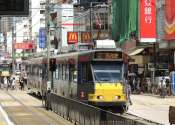Both downtown and suburbs appeal to small, high-growth firms
The movement of high-growth firms that directly contribute to the regional economy may be more complex than previously thought, new research suggests.

The movement of high-growth firms that directly contribute to the regional economy may be more complex than previously thought, new research suggests.
Economics & Business
Mar 29, 2022
0
3

Access to high-quality public transportation can make communities more equitable by increasing access to critical opportunities such as employment, health care and healthy food, particularly for low-income individuals and ...
Social Sciences
Jul 15, 2021
0
2

Worldwide, 267 million people live on land less than two meters above sea level, which is most at risk from sea level rise, according to a study in Nature Communications. The paper suggests that by 2100 the number could increase ...
Environment
Jun 30, 2021
0
9

For one low-income woman, not having a car meant long commutes on public transit with her children in tow, sometimes slogging through cold or inclement weather. But after buying a subsidized car through a Maryland-based nonprofit, ...
Economics & Business
Oct 3, 2020
2
12

New research suggests that demolishing abandoned houses may lead nearby property owners to better maintain their homes.
Economics & Business
Aug 3, 2020
0
2

A new study reveals that urgent action is needed to protect billions of dollars in real estate investment across South Florida due to impacts of sea level rise over the next several decades. Researchers from Florida Atlantic ...
Environment
Jul 29, 2020
0
6

"Scooter clutter" has been a concern amplified by media reports in urban areas where micromobility has entered the landscape, with large numbers of dockless scooters and shared e-bikes on city streets and sidewalks. But a ...
Social Sciences
Mar 4, 2020
0
5

Cities in the "global south"—densely populated urban areas that are part of low-income countries in Asia, Africa and Latin America—should phase out pit latrines, septic tanks and other on-site methods of human waste management.
Environment
Dec 18, 2019
0
9

Holiday travel is stressful enough—we know we're supposed to arrive at the airport early, give extra time to drive places, and expect delays. But what about checking the weather on the other side of the country, routing ...
Social Sciences
Nov 25, 2019
0
4

A new study finds that while the current United States administration's policies in Africa may appear undeveloped, there are distinct trends and tendencies that have the potential to negatively impact Africa's economic growth.
Environment
Nov 19, 2019
1
9